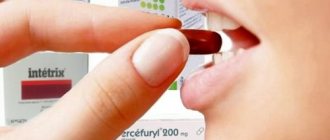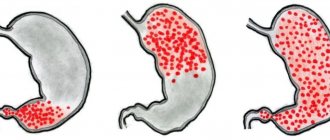There is hardly a person who has not experienced problems with hyperthermia and digestion at least once in his life. Separately, each condition in itself does not pose a danger to an adult. It's worse when they complement each other.
If the symptoms occur at the same time, you need to find out what could be causing the diarrhea accompanied by a high fever. Since the etiology of feeling unwell with such symptoms may indicate major problems in the body.
Conditions of concern
When diarrhea is accompanied by fever, the body quickly enters the stage of dehydration, as fluid loss occurs due to frequent bowel movements and sweating. But the following manifestations should cause concern:
- Paleness of the skin.
- Microcracks on the lips and corners of the mouth.
- Persistent feeling of thirst.
- Excessive dry skin.
- Dark color of urine and small amount of urine.
- The appearance of signs of heart failure (arrhythmia, shortness of breath).
All of these symptoms should alert the patient’s relatives and become a prerequisite for calling an ambulance.
In this video, Elena Malysheva in the Live Healthy program will tell you what diseases cause diarrhea and how to treat them:
Infection as a cause of diarrhea
Diarrhea and a temperature of 38 in an adult are a reason to consult a doctor!
Often, diarrhea is just one symptom of a serious infectious disease. You can easily determine whether this is the case in your case by answering a few simple questions: Does your stomach hurt? Is the temperature rising? Are there other symptoms, such as nausea or vomiting? If you answered yes to one or more questions from the list, most likely you are feeling unwell due to an infection.
First aid for diarrhea
While waiting for the doctor, you need to take emergency measures:
- Give the patient as much water as possible or a decoction of medicinal herbs that have anti-inflammatory properties (chamomile, calendula).
- The “Regidron” or “Essentuki” solution helps replenish lost salts (release the gas).
- To relieve abdominal pain, use antispasmodics, but only if there are no prerequisites for appendicitis, ulcers and other acute conditions requiring surgical intervention.
- To reduce temperature, use drugs with an analgesic effect.
It is strictly forbidden to give the patient alcohol, sweet juices, or coffee.
How to choose anti-diarrhea tablets for adults
When choosing drugs for diarrhea, you need to focus on the causes of intestinal disorders, the patient’s age and concomitant pathologies. Any medications for diarrhea should only be recommended by a doctor after a detailed examination and diagnosis.
Good to know
Diarrhea after antibiotics: we figure out how to avoid it
Among all the drugs prescribed for diarrhea in adults, several groups can be distinguished.
Preparations of the probiotic class. They replenish the supply of beneficial microbes, eliminate disturbances in the intestinal microbial flora, due to which diarrhea and other unpleasant manifestations stop.
Medicines that affect intestinal motility or prokinetics. They slow down powerful and sharp wave-like contractions of the intestine, eliminate spasms, and inhibit the movement of feces to the exit.
Antibiotics and intestinal antiseptics. Drugs that eliminate the main cause of microbial diarrhea - the proliferation of pathogenic flora in the intestinal lumen.
Enterosorbents. This is a group of drugs that adsorb toxins, irritants, poisons on their surface, help compact feces, and relieve intestinal irritation.
Important! All medications for diarrhea, if it lasts more than a day, should only be prescribed by a doctor. During treatment, it is necessary to replenish the loss of fluid and ions.
Acute gastrointestinal conditions
Crohn's disease
Symptoms of the pathology: severe abdominal pain, fever, diarrhea (without blood). The patient's weight drops, weakness appears, and fistulas form in the anus. A severe pathological change in the body is the damage to areas of the intestine by inflammation that violates the integrity of the mucous membrane of the intestines and stomach. The process is comprehensive. In this case, peritonitis and perforation may occur, which will require surgical intervention.
Acute pancreatitis
The cause of inflammation of the pancreas is excessive consumption of alcohol, fried, fatty and poor-quality foods, and carbonated drinks. The disease is accompanied by severe cramping pain. They are often encircling in nature. During attacks of pancreatitis:
- Temperature 37 or 38 C, sometimes rising to 39 C
- Bitterness in the mouth.
- Diarrhea (during defecation, unformed feces contain remains of undigested fatty substances).
- Vomiting without relief.
Top 5 rating according to KP
We have selected the best anti-diarrhea tablets for adults, which are most often prescribed to patients for various forms of diarrhea. Before using any medications, you must consult a doctor and take into account all possible contraindications.
Activated carbon
The drug is available in the form of tablets of a characteristic black color and is sold without a doctor's prescription. The main active ingredient is activated carbon, which belongs to the group of non-selective enterosorbents.
The drug is used:
- for various types of poisoning accompanied by diarrhea and vomiting;
- for intestinal infections in adults with diarrhea;
- for chronic diarrhea in the acute stage;
- for diarrhea of unknown origin to consolidate stool;
- for irritable bowel syndrome with diarrhea syndrome (in complex therapy);
- for food allergies, reactions to medications and other substances that enter the digestive tract;
- for kidney and liver diseases leading to diarrhea.
The drug has a number of contraindications - it is prohibited for use in case of ulcerative lesions of the digestive tract, especially when there is a risk of bleeding (it can mask the presence of blood in the stool). It should not be taken for ulcerative colitis, intestinal atony, or simultaneously with detoxification drugs that are absorbed in the intestine.
Prescribed with caution for diabetes, pregnant women and children, lactating women. It is important to remember that the drug interferes with the absorption of minerals, vitamins, and other medications. Among the side effects, it is worth noting abdominal cramps, constipation, and vitamin deficiency with long-term use.
show more
Loperamide
The main active ingredient is loperamide, which reduces intestinal motility and tone, suppresses diarrhea by inhibiting the excretion of feces, reduces the number of urges to defecate, and increases the tone of the anal sphincter muscles.
The drug is indicated for:
- symptomatic treatment of various types of diarrhea (with allergies, radiation therapy and the use of chemotherapy, with neurogenic diarrhea);
- diarrhea associated with changes in diet, metabolism or hormonal levels;
- infectious diarrhea as part of complex therapy;
- regulation of bowel movements in people who have had an ileostomy.
The drug is contraindicated in case of individual sensitivity to the components of the drug, if intestinal obstruction, diverticulitis, or ulcerative colitis is suspected. It is prohibited to take the medicine for dysentery, pseudomembranous enterocolitis, in the 1st trimester of pregnancy, lactation, and in children under 6 years of age. For problems with the kidneys and liver, it is prescribed only after the doctor’s approval, strictly selecting the dosage.
While taking it, weakness, dizziness, drowsiness, and malaise are possible. The drug is incompatible with alcohol and is prohibited when driving vehicles and activities that require concentration.
show more
Ersefuril
The drug is available in tablet form, sold in pharmacies without a prescription, the main active ingredient is nifuroxazide. Refers to antimicrobial drugs that act primarily in the intestines. It has a bactericidal effect against many types of microbes that cause inflammatory processes.
Does not lead to disruption of the microbial balance of the intestine; in acute microbial diarrhea, it has a eubiotic effect. In case of viral gastroenteritis, it suppresses the risk of secondary microbial diarrhea.
The drug is indicated:
- for bacterial diarrhea;
- for viral diarrhea to prevent superinfection.
Contraindicated in case of allergies to nitrofurans, in children under 3 years of age, pregnant and lactating women, and lactose and maltose intolerance. Side effects include skin rash and mild malaise.
show more
Linex
The drug is available in capsules, powders and drops, sold without a doctor's prescription, and belongs to the group of probiotic drugs. The drug contains biomass of living bacteria - L. Acidophilus, B. infantis and E. faecium in an amount sufficient to normalize the intestinal microbial flora.
Main indications for use:
- elimination of intestinal dysbiosis against the background of diarrhea and other symptoms of indigestion;
- in complex therapy of viral and microbial intestinal infections;
- after treatment with antibiotics.
Contraindicated if you are allergic to the components of the drug or dairy products.
The drug should not be taken with hot liquid; it is incompatible with alcohol. Do not take if you have fever, intestinal bleeding or signs of surgical pathologies.
show more
Furazolidone
The drug is produced in tablets, sold without a prescription, belongs to the group of antimicrobial, antiprotozoal drugs, the main active ingredient is furazolidone. The drug suppresses the activity of pathogenic microbes and protozoa in the intestines, has a wide spectrum of antimicrobial activity, and helps stimulate the immune system.
Indicated for:
- diarrhea due to amoebic dysentery;
- diarrhea due to microbial infections, typhus;
- to eliminate diarrhea caused by Giardia.
Contraindicated in pregnancy, breastfeeding, allergies to nitrofurans, under the age of 3 years, in end-stage renal failure.
Among the side effects, it is worth highlighting allergies, appetite disturbances, and with long-term therapy, neuritis is possible. Incompatible with alcohol and antidepressants, MAO inhibitors, ephedrine.
show more
Gastrointestinal tract infections
All viral or bacterial intestinal diseases are accompanied by hyperthermia and diarrhea. Such symptoms are characteristic of rotavirus infection, dysentery, and salmonellosis.
Rotavirus
The second name is “intestinal flu”. Its symptoms in an adult differ from the course of the disease in children and adolescents. This disease is seasonal, transmitted by contact and airborne droplets, and is accompanied by the following symptoms:
- Vomit.
- Severe liquid diarrhea (yellow in the first days).
- Fever.
- Weakness and drowsiness.
- Symptoms of ARVI (runny nose, cough, stomach ache).
The main condition for treatment is restoration of the body’s water balance, replenishment of salts and minerals, and the mandatory use of drug therapy.
"Remantadine" is an effective remedy for "intestinal flu", adults and adolescents take 100 mg of the drug twice a day.
Salmonellosis and dysentery
These bacterial infections are recognized by the following symptoms:
- Fever.
- Chills.
- Weakness throughout the body.
- Vomit.
- Green stool with blood and mucus.
To avoid unpleasant consequences, the help of a doctor is required.
Viral arthritis
We are talking about such a serious disease when fever, diarrhea and vomiting are accompanied by the appearance of a rash and muscle aches. As a consequence of such manifestations, damage to the articular joints or the joint itself occurs.
At the first symptoms, it is recommended to consult a doctor.
Typhoid fever
An infectious disease that is accompanied by the following symptoms:
- Hypermetry.
- Green diarrhea interspersed with blood and mucus.
- Vomit.
- Rash (large pink spots up to half a centimeter in size form on the body).
- Headache.
Treatment takes place in an inpatient setting.
"Traveller's Diarrhea"
Intestinal disease directly related to visiting countries in Asia, Africa, and South America. This also includes a trip to the sea. The main cause of the disease is non-compliance with hygiene rules. If you start treatment when the first symptoms appear, it all goes away within a week. To do this, it is recommended to wash your hands, eat clean vegetables and fruits, and not eat food purchased from random street vendors.
Appendicitis - symptoms and prognosis
Appendicitis is an inflammatory process in the appendix, the vermiform appendix of the cecum. Causes of the disease:
- Infections
- Eating disorder
- Individual characteristics of the body
- Vascular thrombosis
- Heredity
- Stress, bad habits
- Gynecological diseases
Symptoms of the disease:
- Pain – initially in the solar plexus area, then moves to the lower right quadrant of the abdomen
- Nausea
- Vomit
- Temperature increase
Diarrhea and fever during pregnancy
During the period of bearing a child in the first trimester, a woman may experience nausea, vomiting, diarrhea, and fever. This phenomenon is called pregnancy toxicosis, and it occurs due to changes in hormonal levels. There are early (first trimester) and late (last 3 months before birth) toxicosis. Symptoms do not pose a danger to a pregnant woman if:
- The temperature does not rise above 38 degrees.
- Stools are infrequent, of normal consistency;
- There are no traces of blood or mucus in the stool during defecation.
- There are no obvious signs of intoxication.
If a clinical picture of acute poisoning of the body occurs, the woman should see a doctor and be treated according to his instructions, because this is fraught with negative consequences both for herself and for the intrauterine development of the baby.
Hepatitis - signs, symptoms, prognosis
Hepatitis is an inflammatory disease of the liver of various etiologies. Classification of hepatitis:
- Viral – A, B, C, D
- Mechanical - most often it is irritation of the gallbladder ducts with stones
- Toxic
- Cryptogenic – chronic inflammatory processes of unknown origin
Hepatitis is an inflammatory disease of the liver of various etiologies.
The causes of inflammatory processes in the liver depend on the type of hepatitis. Thus, Botkin’s disease, which is familiar to us, hepatitis A, is a typical “disease of dirty hands.” Other varieties – B, C, D – contact forms. Transmitted through blood transfusions, sexual intercourse, injections and other damage to the skin.
Toxic hepatitis develops due to the action of various toxic substances, medications, and alcohol. The cryptogenic form of liver inflammation is a chronic disease. Symptoms are often vague and diagnosing the disease is difficult. Symptoms of hepatitis depend on the type of disease, but the general signs are similar to each other:
- Temperature rise to 37o C or higher
- Nausea
- Vomit
- Diarrhea
- Change in stool color - stool becomes very light and urine becomes unnaturally dark in color
- Pain in the liver area
- Yellowing of the sclera, skin, nails
Treatment of hepatitis is carried out only in a hospital setting. With timely consultation with a doctor and proper treatment, the prognosis for recovery is favorable.
Folk remedies
It is possible to treat infectious diseases of the gastrointestinal tract at home, using traditional medicine recipes, but this is recommended only in case of a mild degree of the disorder.
- For the treatment of adults, a recipe based on vodka is used. Salt is added to 50 ml of this drink and consumed once a day. This recipe is contraindicated for people with alcohol addiction.
- The most effective way to get rid of diarrhea is to take a decoction of alder buds: pour a tablespoon of crushed cones with a glass of boiling water and leave in a water bath for 30 minutes, strain, add water to a volume of 200 ml and take 1 tablespoon three times a day.
- Chamomile decoction gives a positive effect when treated at home; it is prepared and taken, like alder fruits.
If after a few days of treatment with herbal decoctions there is no positive effect, it is necessary to seek medical help and undergo diagnostics to establish an accurate diagnosis of the disease.
In case of acute intestinal disorder or relapse of gastrointestinal diseases, self-medication cannot be done. Only consultation with a specialist will help here.
Other types of acute diarrhea
High temperature is an alarming symptom
If diarrhea is not a consequence of some other disease, it is much easier to deal with it. In order to improve your well-being, you need:
- Stop taking any medications that may cause diarrhea (carefully read the list of side effects for each drug you are taking).
- Restore your emotional balance.
- Take a sedative, spend time on your hobby, go on a romantic date.
- As an emergency measure, you can take Metoprolol or Anaprilin (be careful: both of these drugs have a huge number of contraindications).
- To cope with pain, take antispasmodics (any medicine containing mebeverine and otilonium bromide) twice or thrice a day.
- Adaptogenic herbal tinctures, for example, ginseng or lemongrass, are good for pain relief.







